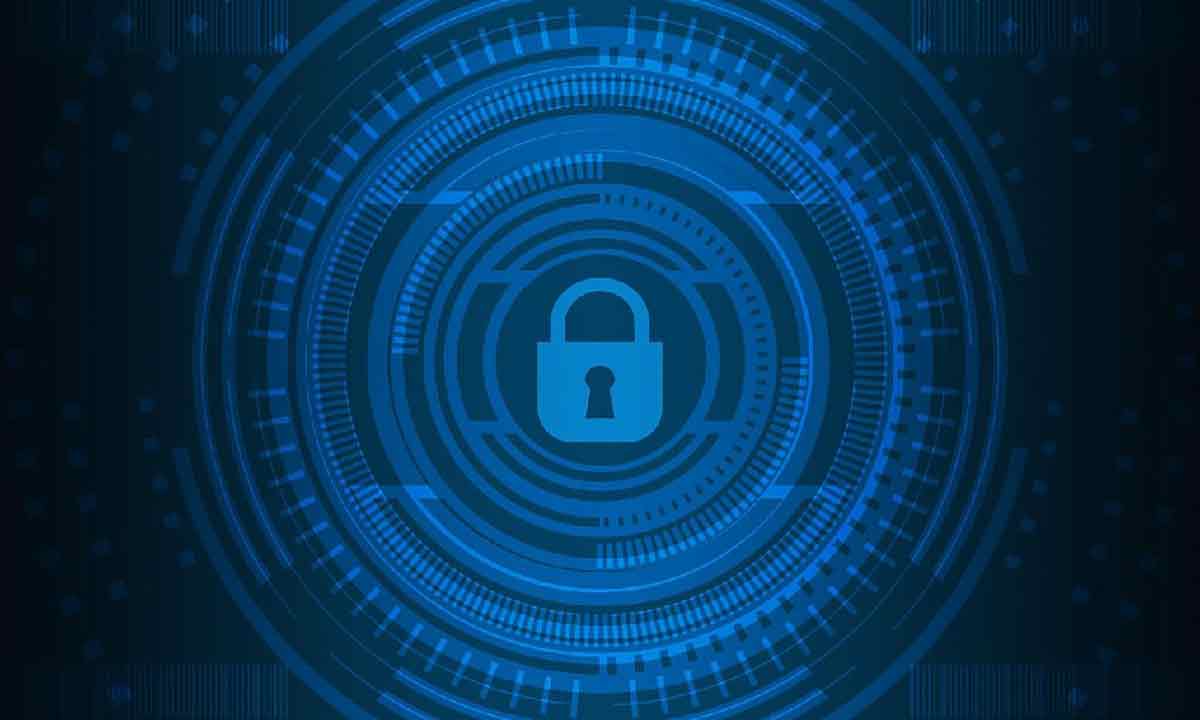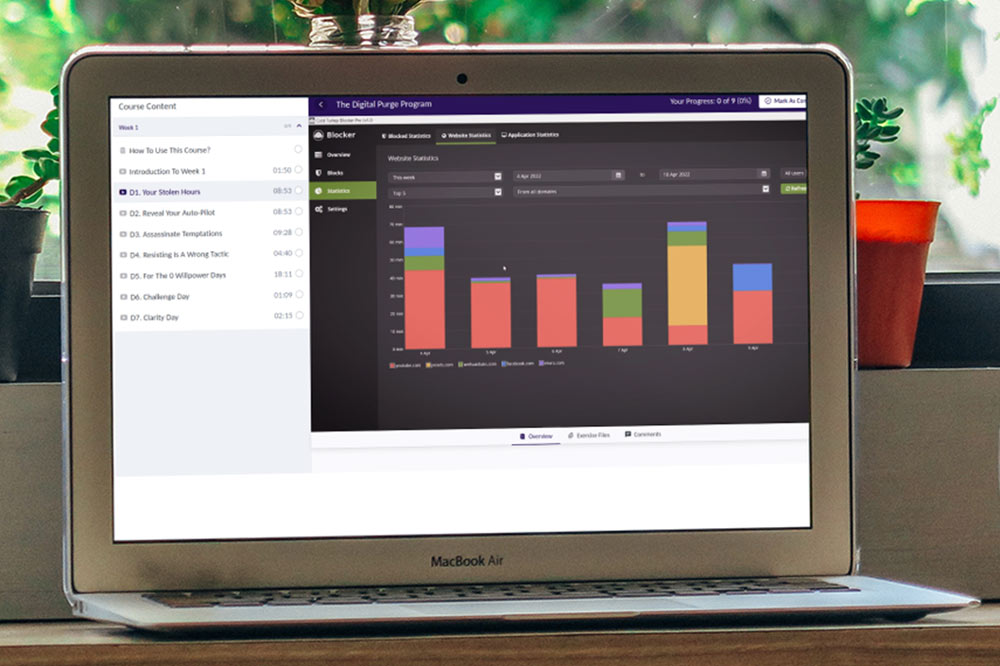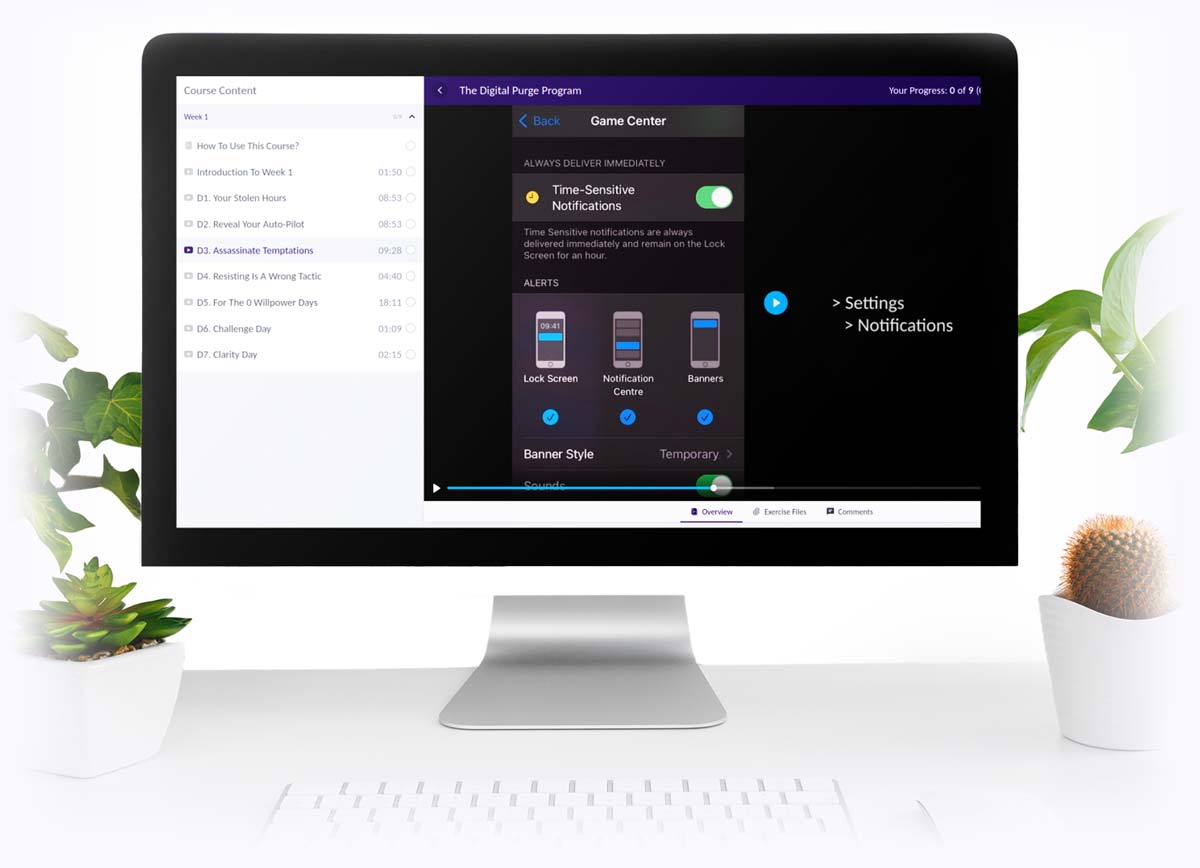Welcome to our digital detoxing series! A series on how to stop addiction to Fortnite, Facebook, Instagram, Porn, Netflix, Youtube, Tinder… (find all the posts here). Today, let’s talk about how to quit the cyber addiction.
- What’s the cyber addiction?
- Addiction to cyber, a “real” addiction?
- What’s considered cyber addiction
- How much cyber is too much?
- Some technology addiction facts & statistics
- Symptoms & Causes of the cyber addiction
- Why is cyber so addictive?
- Possible causes of cyber dependency
- Symptoms, Causes and Signs of cyber addiction
- Problems, impacts & bad effects of cyber
- Some benefits of cyber
- health problems
- impact on brain & mental health
- impact on relationships
- How to stop & quit your cyber addiction
- Main steps and solutions to break the cyber addiction
- Best cyber blocker apps & functionalities
- where to seek extra help?
- Conclusion
- To Go Further
- How to help someone with cyber addiction
- Best books about technology addiction
- Research about technology addiction
About cyber

Cyber refers to anything related to computers, digital technology, and the internet. It encompasses everything from online communication and social media to cybersecurity and hacking.
Addiction to cyber, a “real” addiction?
Officially an addiction?
First, let’s have a look to the DSM-5,the Diagnostic and Statistical Manual of Mental Disorders. Does it includes cyber addiction?
No, cyber addiction is not listed as a separate disorder in the DSM-5 (Diagnostic and Statistical Manual of Mental Disorders, Fifth Edition). However, it may be included under other disorders such as internet gaming disorder or problematic internet use.
So what is the definition of “cyber addiction”?
Cyber addiction, also known as internet addiction or technology addiction, refers to the excessive and compulsive use of digital devices and technology, such as smartphones, computers, social media, video games, and the internet. It is characterized by a loss of control over the use of technology, which leads to negative consequences in various areas of life, including social, psychological, and occupational functioning. Cyber addiction can lead to a range of problems, such as depression, anxiety, sleep disturbances, poor academic or work performance, and relationship difficulties.
What is considered cyber addiction?
There is no official diagnostic criteria for cyber addiction in the Diagnostic and Statistical Manual of Mental Disorders (DSM-
- 5., but some experts have proposed the following criteria:
- 1. Preoccupation with the internet or digital devices, including excessive use or an intense desire to use them.
- 2. Withdrawal symptoms when not able to use the internet or digital devices, such as anxiety, irritability, or depression.
- 3. Loss of control over internet or digital device use, including spending more time than intended or being unable to cut back.
- 4. Neglect of other important activities, such as work, school, or social relationships, in favor of internet or digital device use.
- 5. Continued use despite negative consequences, such as poor academic or job performance, relationship problems, or health issues.
It is important to note that these criteria are not universally accepted and that excessive internet use can be a symptom of other underlying mental health conditions, such as depression or anxiety. It is always best to seek professional help if you or someone you know is struggling with excessive internet or digital device use.
How much cyber is too much?
There is no set amount of time that is considered “too much” when it comes to using the internet or engaging in cyber activities. However, it is important to maintain a healthy balance between online and offline activities. Spending excessive amounts of time online can lead to negative effects such as decreased social interaction, addiction, and a decline in physical health. It is recommended to set limits on screen time and prioritize other activities such as exercise, socializing, and hobbies. It is also important to be aware of the potential risks associated with excessive internet use, such as cyberbullying, online predators, and exposure to inappropriate content.
Some technology addiction facts & statistics

Technology addiction is a growing concern in today’s world. Here are some statistics related to technology addiction:
- 1. According to a 2019 survey by Common Sense Media, 50% of teens feel addicted to their mobile devices.
- 2. A study conducted by the Pew Research Center found that 28% of adults in the US feel they are constantly online.
- 3. A survey conducted by the American Psychological Association found that 43% of Americans are constantly checking their electronic devices for email, texts, or social media updates.
- 4. A survey conducted by the Royal Society of Public Health in the UK found that social media is the most addictive technology, with 63% of respondents reporting that they check their social media accounts at least once a day.
- 5. In a study conducted by the University of Maryland, students were asked to give up all technology for 24 hours. Many of the participants experienced withdrawal symptoms such as anxiety, irritability, and even physical symptoms such as headaches.
- 6. A study conducted by the University of Gothenburg in Sweden found that excessive use of mobile phones can lead to sleep disorders, depression, and anxiety.
- 7. According to the World Health Organization, internet addiction disorder (IAD) is a real condition that can have serious negative consequences on an individual’s mental and physical health.
Is the cyber addiction widespread?
It is well-known that excessive use of the internet, social media, and other digital technologies can lead to addiction-like behaviors and negative impacts on mental health and well-being. It is important to use these technologies in moderation and seek help if one feels they may be struggling with addiction.
Symptoms, Causes and Signs of cyber addiction
Why is cyber so addictive?
There are several reasons why cyber activities can be addictive:
- 1. Instant gratification: Cyber activities provide instant rewards, such as likes, comments, and messages. This can create a dopamine rush in the brain, which can make the activity more rewarding and addictive.
- 2. Social connection: Cyber activities can provide a sense of social connection and belonging, which can be addictive for people who struggle with social anxiety or loneliness.
- 3. Escapism: Cyber activities can provide an escape from real-life problems and stressors, which can be appealing to people who are struggling with mental health issues.
- 4. FOMO: The fear of missing out (FOMO) can also contribute to cyber addiction, as people feel compelled to constantly check their social media and other online activities to stay up-to-date on what others are doing.
Overall, cyber addiction can be a complex issue that is influenced by a range of factors, including individual personality traits, social and environmental factors, and the design of the technology itself.
Possible causes of cyber dependency
There are several reasons why people may develop cyber addiction:
- 1. Instant gratification: The internet and technology provide instant gratification, which can be addictive for some people.
- 2. Social isolation: People who are socially isolated or have difficulty making connections in the real world may turn to online interactions as a way to feel connected.
- 3. Escapism: The internet can be a way to escape from reality and its problems, leading to excessive use.
- 4. Gaming: Online gaming can be particularly addictive due to the competitive nature and sense of achievement.
- 5. Peer pressure: Social media and online culture can create a sense of pressure to constantly be connected and engaged with online communities.
- 6. Mental health issues: People with underlying mental health issues, such as depression or anxiety, may turn to the internet as a coping mechanism, leading to addiction.
- 7. Easy accessibility: The internet is easily accessible, making it easy for people to spend excessive amounts of time online.
Signs & Symptoms of cyber addiction
Now let’s see if you have the cyber addiction problem
- 1. You prioritize online activities over real-life responsibilities: If you find yourself consistently choosing to spend time online instead of fulfilling important tasks such as work, school, or personal relationships, it might be a sign of addiction.
- 2. You feel anxious or irritable when you can’t access the internet: If you experience anxiety, restlessness, or irritability when you are unable to access the internet or your devices, it could be a sign of addiction.
- 3. You spend excessive amounts of time online: If you find yourself spending hours upon hours online every day, even to the point of neglecting other important areas of your life, it could be a sign of addiction.
- 4. You have trouble controlling your online behavior: If you find it difficult to stop or moderate your online behavior, even if it interferes with your daily life, it could be a sign of addiction.
- 5. You experience physical symptoms related to online use: If you experience physical symptoms such as eye strain, headaches, or back pain due to excessive online use, it might be a sign of addiction.
- 6. You neglect personal relationships for online interactions: If you find yourself neglecting personal relationships in favor of online interactions, it could be a sign of addiction.
- 7. You experience a decline in mental health: If you experience depression, anxiety, or other mental health issues due to excessive online use, it could be a sign of addiction.
Problems, impacts & bad effects of cyber: should you quit your cyber addiction?

What are some benefits of cyber
Here are some common pros and advantages of cyber:
- 1. Convenience: Cyber technology makes communication and transactions more convenient and efficient. With just a few clicks, you can send an email, transfer money, or make a purchase online.
- 2. Global Reach: Cyber technology allows people to connect and interact with others from all over the world. It breaks down geographical barriers and creates a more connected global community.
- 3. Speed: Cyber technology enables fast and immediate access to information, services, and products. This speed can improve productivity and save time.
- 4. Cost-effective: Cyber technology can be more cost-effective than traditional methods. For example, online shopping can often be cheaper than shopping in a physical store.
- 5. Innovation: Cyber technology is constantly evolving and improving. This creates new opportunities for innovation and growth in various industries.
- 6. Security: Cyber technology also offers improved security measures to protect personal information and prevent cyber crimes.
Overall, cyber technology has revolutionized the way we live and work, and has brought many benefits to society.But at the opposite, what can be some cyber addiction problems addicts suffer from?
general health problems
- 1. Mental health: Constant exposure to cyberbullying or negative online content can lead to anxiety, depression, and other mental health issues.
- 2. Physical health: Spending long hours sitting in front of a computer or smartphone can lead to poor posture, eye strain, and other physical health issues.
- 3. Sleep disturbances: The blue light emitted by screens can interfere with sleep patterns, leading to insomnia and other sleep disorders.
- 4. Addiction: Excessive use of the internet or social media can lead to addiction, which can impact your mental and physical health.
- 5. Stress: Constantly checking emails or social media notifications can lead to stress and anxiety, which can have negative effects on your health.
- 6. Cyberchondria: The tendency to self-diagnose and worry about health issues based on information found online can lead to unnecessary anxiety and stress.
- 7. Cyberstalking: Cyberstalking can lead to fear, anxiety, and other mental health issues.
- 8. Online harassment: Online harassment can lead to anxiety, depression, and other mental health issues.
- 9. Identity theft: Identity theft can lead to financial stress, which can impact your mental and physical health.
- 10. Privacy concerns: Concerns about online privacy can lead to stress and anxiety, impacting your mental health.
cyber and sleep disorder
Yes, cyber activities can create sleep disorders or sleep problems. Here are a few ways in which it can happen:
- 1. Blue light exposure: The blue light emitted by electronic devices such as smartphones, laptops, and tablets can interfere with the production of melatonin, a hormone that regulates sleep.
- 2. Overstimulation: Engaging in cyber activities such as gaming or social media can be overstimulating and make it difficult to unwind and fall asleep.
- 3. Disrupted sleep patterns: Cyber activities can disrupt sleep patterns, leading to irregular sleep schedules and insomnia.
- 4. Stress and anxiety: Cyber activities can be a source of stress and anxiety, which can interfere with sleep.
In summary, excessive use of electronic devices and cyber activities can negatively impact sleep and lead to sleep disorders or sleep problems. It is recommended to limit screen time before bedtime and establish a sleep routine to promote healthy sleep habits.
cyber affecting your brain & mental health: bad for brain and mental health?
Some effects of cyber on your brain
- 1. Addiction: Cyber activities like social media, gaming, and online gambling can trigger the release of dopamine in the brain, leading to addiction.
- 2. Anxiety and Depression: Cyberbullying, online harassment, and negative comments on social media can lead to anxiety and depression.
- 3. Shortened Attention Span: Multi-tasking and frequent interruptions while using the internet can lead to a shortened attention span.
- 4. Decreased Communication Skills: Overuse of technology can reduce face-to-face communication skills and the ability to read nonverbal cues.
- 5. Sleep Disruption: The blue light emitted by electronic devices can interfere with sleep patterns, leading to sleep disruption.
- 6. Reduced Memory and Learning: Relying on the internet to store information can reduce the brain’s ability to remember and learn new things.
- 7. Reduced Creativity: Overuse of technology can reduce creativity and the ability to think outside the box.
- 8. Decreased Empathy: Online communication can reduce empathy and the ability to understand and relate to others’ emotions.
Some effects of cyber on your mental health
The bad effects of cyber on your mental health are as follows:
- 1. Cyberbullying: Cyberbullying can cause anxiety, depression, and self-esteem issues. It can also lead to suicide in extreme cases.
- 2. Addiction: Spending too much time on social media and the internet can lead to addiction. This can cause anxiety, depression, and other mental health issues.
- 3. Sleep disorders: Using electronic devices before bedtime can disrupt your sleep cycle, leading to sleep disorders such as insomnia.
- 4. Fear of missing out (FOMO): Social media can create a sense of competition and comparison, leading to FOMO. This can cause anxiety and depression.
- 5. Cyberchondria: Online searches for health information can lead to cyberchondria, causing anxiety and stress.
- 6. Information overload: Too much information online can lead to overload, causing stress and anxiety.
- 7. Isolation: Spending too much time online can lead to isolation and a lack of social interaction. This can lead to depression and anxiety.
- 8. Cyberstalking: Cyberstalking can cause anxiety and fear, leading to mental health issues.
- 9. Online harassment: Online harassment can cause anxiety, depression, and other mental health issues.
Overall, it is important to use the internet and social media in moderation to avoid the negative effects on mental health.
Does cyber cause stress and anxiety?
Yes, cyber activities can cause stress and anxiety. In today’s digital age, we are constantly connected to our devices and online platforms, which can lead to information overload, social comparison, cyberbullying, and fear of missing out (FOMO). Excessive use of social media, email, and other online activities can lead to a feeling of being overwhelmed, which can cause stress and anxiety. Cyberbullying, online harassment, and the fear of being hacked or scammed can also contribute to feelings of anxiety and stress. It is important to maintain a healthy balance between online and offline activities and to take breaks from technology to alleviate stress and anxiety.
Can cyber addiction lead to sadness and depression?

Yes, cyber addiction can lead to sadness and depression. Spending excessive amounts of time online and engaging in activities such as social media, gaming, and other forms of digital entertainment can lead to feelings of isolation, loneliness, and anxiety. These negative emotions can then lead to depression and other mental health problems.
Additionally, the constant stimulation of the digital world can lead to a decrease in the production of dopamine, the brain chemical associated with pleasure and reward, which can lead to feelings of sadness and decreased motivation. It is important to monitor and manage one’s digital usage to prevent the negative effects of cyber addiction.
Dopamine and cyber
Dopamine is a neurotransmitter that is associated with pleasure and reward in the brain. When we experience something pleasurable, such as eating a delicious meal or receiving a compliment, dopamine is released in the brain, which gives us a sense of pleasure and satisfaction. In the context of cyber, dopamine can be released when we receive likes, comments, and shares on social media, when we win a game, or when we make a successful online purchase. This release of dopamine can lead to addictive behaviors, as people seek out more and more online experiences that trigger the release of this feel-good neurotransmitter. Cyber addiction, or internet addiction, is a growing concern as people spend more and more time online, seeking out these pleasurable experiences and potentially becoming dependent on them.
cyber effects on Focus, productivity, attention span, academic performance…
Yes, cyber affects can have an impact on focus, productivity, attention span, and academic performance. Here are some ways in which cyber affects can affect these areas:
- 1. Distractions: Cyber affects such as social media, email notifications, and online messaging can be distracting, leading to a loss of focus and productivity.
- 2. Multitasking: Cyber affects can also make it tempting to multitask, which can lead to reduced attention span and poorer academic performance.
- 3. Lack of sleep: Spending too much time on electronic devices can interfere with sleep, leading to fatigue and reduced productivity.
- 4. Addiction: Cyber affects can be addictive, leading to excessive use and a negative impact on academic performance.
- 5. Cyberbullying: Cyberbullying can have a serious impact on mental health and academic performance.
It is important to take steps to manage cyber affects and find a balance between technology use and other activities to maintain focus, productivity, attention span, and academic performance.
A word about ADHD and cyber
People with ADHD may interact differently with cyber depending on their individual symptoms and coping mechanisms. Some common ways people with ADHD may interact differently with cyber include:
- 1. Easily getting distracted: People with ADHD may have difficulty focusing on one task at a time, which can make it challenging to stay on task while using the internet.
- 2. Hyperfocus: People with ADHD may also experience hyperfocus, where they become completely absorbed in a task or activity, often to the point of neglecting other important tasks.
- 3. Impulsivity: People with ADHD may be more likely to impulsively respond to messages or post comments without fully thinking through the consequences.
- 4. Social media addiction: People with ADHD may be more susceptible to social media addiction due to the instant gratification and constant stimulation that social media provides.
- 5. Multitasking: Some people with ADHD may be skilled at multitasking, which can be an advantage when using multiple screens or applications simultaneously.
Overall, people with ADHD may interact differently with cyber, but it ultimately depends on their individual symptoms and coping mechanisms.
affecting your relationships
cyber and self-esteem
Cyber affects self-esteem in several ways. Here are a few examples:
- 1. Social media: Social media can have a significant impact on self-esteem. People often compare themselves with others on social media, and this can lead to feelings of inadequacy and low self-esteem. For example, seeing pictures of friends on vacation or at parties may make a person feel like they are missing out on something.
- 2. Cyberbullying: Cyberbullying can have a devastating effect on a person’s self-esteem. If someone is constantly harassed online, they may begin to feel helpless, worthless, and even suicidal. Cyberbullying can happen on social media, texting, email, and other online platforms.
- 3. Online trolling: Trolling is a type of online harassment where a person posts inflammatory or offensive comments to provoke a response. Trolling can cause a lot of stress and anxiety for the victim, leading to a decrease in self-esteem.
- 4. Online dating: Online dating can be a great way to meet new people, but it can also be a source of low self-esteem. If a person is constantly rejected or ignored on dating apps, they may start to feel like they are not attractive or desirable.
- 5. Gaming: Gaming can be a fun way to pass the time, but it can also lead to feelings of low self-esteem. If a person is constantly losing at a game or being criticized by other players, they may start to feel like they are not good enough.
cyber addiction leads to isolation and loneliness?
.jpg)
Yes, cyber addiction can lead to isolation and loneliness. When someone becomes addicted to the internet or technology, they often spend excessive amounts of time online or engaged in digital activities. This can lead to them neglecting their social relationships and withdrawing from face-to-face interactions with family and friends. As a result, they may feel lonely and isolated, which can negatively impact their mental and emotional well-being.
Additionally, excessive use of technology can disrupt sleep patterns and lead to physical health problems, which can further contribute to feelings of isolation and loneliness.
Effects of cyber on your relationship
Positive effects of cyber on your relationship:
- 1. Communication: With the help of technology, you can communicate with your partner from anywhere in the world at any time. This can help maintain a strong connection and keep the relationship alive.
- 2. Accessibility: Social media platforms such as Facebook, Instagram, and Twitter can help you stay in touch with your partner and keep up-to-date on their life, even if you are physically apart.
- 3. Convenience: Technology can make planning dates and making reservations easier and more convenient, allowing you to spend more time enjoying each other’s company.
Negative effects of cyber on your relationship:
- 1. Miscommunication: Texting and messaging can lead to misunderstandings and misinterpretations of tone and intent, which can cause unnecessary arguments and conflict.
- 2. Overdependence: Over-reliance on technology can lead to a lack of face-to-face communication and physical intimacy, which can be detrimental to a relationship.
- 3. Cyber infidelity: Social media and dating apps can make it easier for people to engage in emotional or physical cheating, which can lead to the breakdown of a relationship.
How To Stop & quit Your cyber Addiction
Finally you think you are addicted to cyber and you are wondering how to quit it? How to break and overcome your cravings for cyber?
Here are the best solutions, steps, supports, resources and help you can get to treat your cyber addiction.
Main steps and solutions to break the cyber addiction
Here are some steps to get rid of cyber addiction:
- 1. Acknowledge the problem: Admitting that you have a problem is the first step towards recovery. Recognize that you have an addiction to the internet and take responsibility for it.
- 2. Set boundaries: Establish limits for your internet use. Decide how much time you want to spend online each day and stick to it.
- 3. Find alternative activities: Find other activities that you enjoy doing and that can replace the time you spend online. This could be reading, exercising, or spending time with friends and family.
- 4. Seek support: Talk to your friends and family about your addiction and seek their support. You can also join support groups or seek professional help if necessary.
- 5. Avoid triggers: Identify the triggers that lead you to use the internet excessively and try to avoid them. For example, if you tend to spend too much time online when you are bored, find other ways to occupy your time.
- 6. Take breaks: Take regular breaks from the internet to recharge and give your mind a break.
- 7. Practice self-care: Take care of yourself physically and mentally. Eat well, exercise regularly, and get enough sleep. This will help you stay balanced and reduce your cravings for online activity.
So our team, after testing many ways, designed a bulletproof way to overcome them. Here are some clear and practical steps that are very powerful to quit a digital addiction, including cyber:
1. Purge temptations: Get rid of cyber
First, cleaning your life from temptations is much easier than resisting to them. Disable or delete your cyber accounts, change the password and hide it somewhere you can’t access easily, keep your phone / computer far away… Out of sight out of mind.
Here is a video from our course the The Digital Purge. on how to add resistance to your temptations, so you become so lazy to engage with them that you give them up:
Click here if you want to see more of the Digital Purge!





